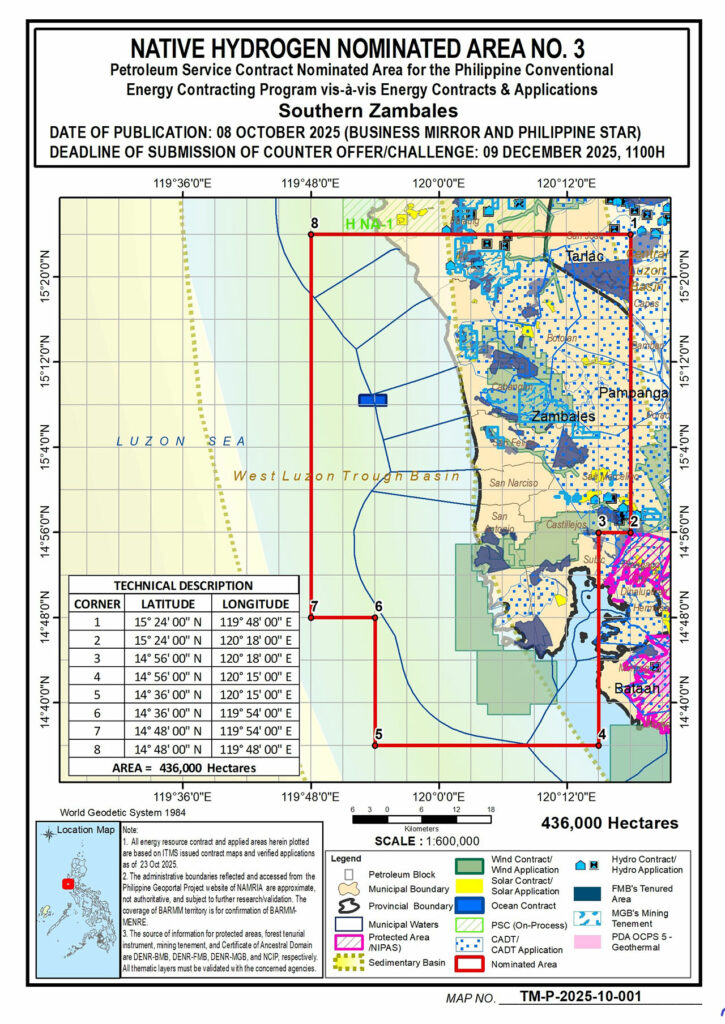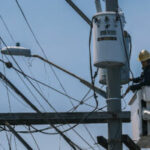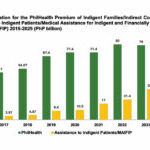By Sheldin Joy Talavera, reporter
Department of Energy (DoE) Inviting interested industry Players must submit competitive proposals to locate potential natives Hydrogen resources in Nominatural area in southern Zambales, with four more in the pipeline.
In an invitation published on its website, the DoE said interested companies can submit challenges for the nominated area spanning 436,000 hectares to secure a contract under the Philippine Conventional Energy Contract Program.
Applicants can submit their counter offers till 9th December, 11 am

Edgar Benedict C. Kationgco, president of the Philippine Petroleum Association, said the newly designated area application for native hydrogen exploration marks the “strategic expansion of the Philippines' hydrogen frontier.”
Southern Zambales – part of the geologically important Zambales mountain range – contains ultramafic rocks that are capable of producing native hydrogen through a natural geochemical process called serpentinization, he said.
“This nomination signals the growing momentum in the exploration of naturally occurring hydrogen, also known as white hydrogen, which is gaining global traction as a clean energy investment,” Mr Kationgco said. businessworld,
DOE Director of the Bureau of Energy Resources Development Demujin F. Antiporda told businessworld There are four more nominated regions that will be up for the challenge. These include two hydrogen contracts, and two development and production petroleum services contracts.
Mr. Antiporda said foreign firms have submitted these nominated areas.
“We are the first in the world to offer a bid for hydrogen,” he said, adding that hydrogen development globally is still in its early stages.
The Philippine government recently awarded eight new petroleum services contracts, representing a potential investment of approximately $207 million over a seven-year exploration period.
The award of the service contract provides an opportunity to explore potential petroleum and hydrogen resources in key areas of the Sulu Sea, Cagayan, Cebu, North-West Palawan, Eastern Palawan and Central Luzon.
Several local and foreign companies won petroleum services contracts, including Pangilinan-led PXP Energy Corp., Australia's Triangle Energy (Global) Ltd. and Gas 2 Grid Pte. Ltd., Sunda Energy PLC of the United Kingdom, Ratio Petroleum Ltd. of Israel, and US-based Coloma, Inc.
With the contracts in place, companies can begin their respective work programs, which include geological and geophysical studies, seismic surveys and drilling activities to assess the potential of the contract areas.
While seeking to increase the use of indigenous petroleum resources, the Philippines is also exploring the potential of hydrogen as an alternative fuel to reduce dependence on imported oil.
The Philippines sees the potential for development and domestic production of hydrogen and its derivatives as a “promising, innovative and environment-friendly” energy solution that can largely support ongoing energy transition efforts.
“With several ultramafic-rich areas throughout the archipelago, the country is uniquely positioned to lead in this emerging field,” Mr Cutiongco said.
“The combination of favorable geology and a progressive fiscal regime makes native hydrogen exploration an attractive next step beyond conventional hydrocarbon development.”
Mr. Kationgco said this will not only strengthen the Philippines' energy roadmap but will also open new avenues for investment, research and regional cooperation with its association. Partners of Southeast Asian Nations.










